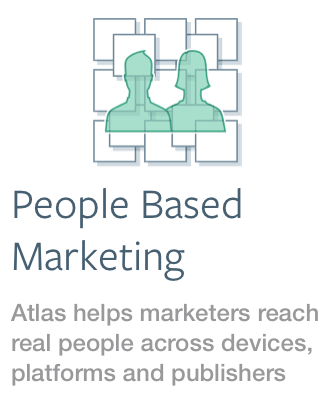Vakar saules gaismu ieraudzīja jauns reklāmas tīkls Atlas, kuru izveidoja Facebook.

Lietotājus ar mobilajām ierīcēm kļūst grūtāk “iezīmēt” un parādīt viņiem atbilstošu reklāmu. Talkā nāk sociālie tīkli – Google un tagad arī Facebook. Pirms diviem gadiem Facebook veidotāji nezināja, kā nopelnīt uz mobilo ierīču lietotāju rēķina, tagad viņi ir palaiduši platformu, kas atpelnīs investoru naudu.
The Facebook login is most useful on mobile devices, where traditional web tracking tools like cookies and pixel tags do not work. If a person is logged into the Facebook app on a smartphone, the company has the ability to see what other apps he or she is using and could show ads within those apps.
Tas ir tikai loģisks turpinājums iesāktam virzienam.
Ja Facebook grib eksistēt kā bezmaksas platforma, tad vienīgais veids kā atpelnīt investētos līdzekļus ir pārdot vairāk reklāmas. Ja lietotāji Facebook iekšienē pārāk maz klikšķina uz reklāmām, tad nekas neatliek kā šo informāciju iznest ārā. Pārdot reklāmas var arī citās vietās, kur šie lietotāji apgrozās.
Facebook says it is working with lots of partners, but so far has named only two. Ad holding giant Omnicom, which already has deals with Facebook, Google, Twitter and most other big digital players, says it will buy ads with Atlas. Facebook’s Instagram will also work with the platform. The most tantalizing notion I’ve heard this week is that Facebook has talked to Twitter about joining up, and that the idea remains a possibility.
Uztraukumam nav pamata. Facebook tīklā esot 1.3 miljardi lietotāju. Tā ir milzīga kritiskā masa, lai spētu veiksmīgi attīstīt jauno reklāmas tīklu tuvākos gadus.
Paņemam Twitter, kurš mēģina nopelnīt, veidojot jaunas preču pirkšanas iespējas savā tīklā, saliekam kopā ar datiem no Facebook un lieta darīta.
Nav ļaunuma bez labuma. Pateicoties Facebook darbībām un arvien lielākai savu lietotāju datu tirgošanai, veidojas alternatīvas kustības, piemēram, šis Ello – anti-facebook sociālais tīkls.
Your social network is owned by advertisers.
Every post you share, every friend you make and every link you follow is tracked, recorded and converted into data. Advertisers buy your data so they can show you more ads. You are the product that’s bought and sold.
We believe there is a better way. We believe in audacity. We believe in beauty, simplicity and transparency. We believe that the people who make things and the people who use them should be in partnership.
We believe a social network can be a tool for empowerment. Not a tool to deceive, coerce and manipulate — but a place to connect, create and celebrate life.
Pēdējā laikā šis tīkls gūst arvien lielāku popularitāti.
Ello is receiving anywhere from 4,000 to more than 30,000 requests an hour
Iespējams, ka mēs esam izauguši līdz brīdim, kad pietiekami liela lietotāju auditorija ir gatava piemaksāt par to, lai varētu lietot sociālo tīklu un viņu datus nepārdotu reklāmdevējiem. Jo tas ir jaunā sociālā tīkla Ello biznesa modelis.
But just because Budnitz and his cofounders see no place for advertising on their site doesn’t mean they don’t want to make money. In fact, the company raised $435,000 in VC funding prior to its recent explosive growth.
Tā kā viss ir štokos. Dzīvosim redzēsim.
Ir vēl labāks veids, kā tikt vaļā no reklāmām sociālajos tīklos – nelietot tos 🙂
Nu labi, brīz jau pasi nevarēs dabūt bez facebook konta un nelaidīs pāri robežai, ja tev nav twitter accounts, tā kā mani dinozauriskie spriedumi te nevietā. Bet no otras puses, es nelietoju un nejūtos apdalīts 🙂 Pārāk liels drazainas informācijas daudzums ir kaitīgs jūsu veselībai 🙂
m
Būtiska piebilde:
Facebook nevis “Izveidoja”, bet gan iegādājās šo reklāmas tīklu no Microsoft. Te ir atsauce: http://techcrunch.com/2013/02/28/facebook-acquires-atlas/